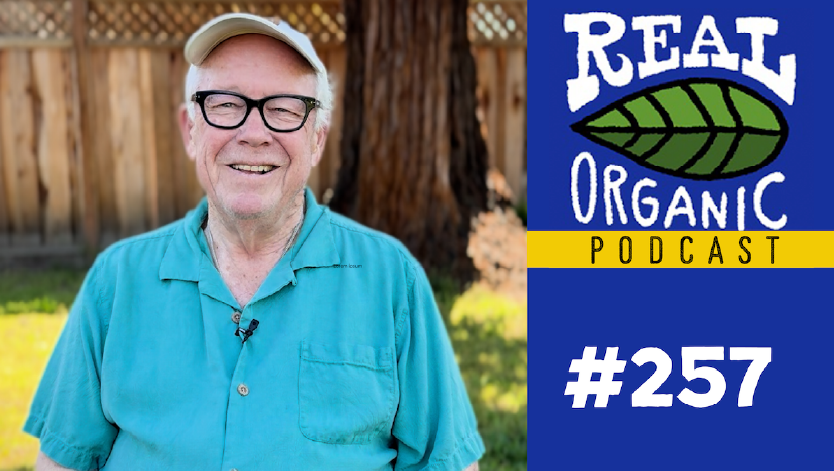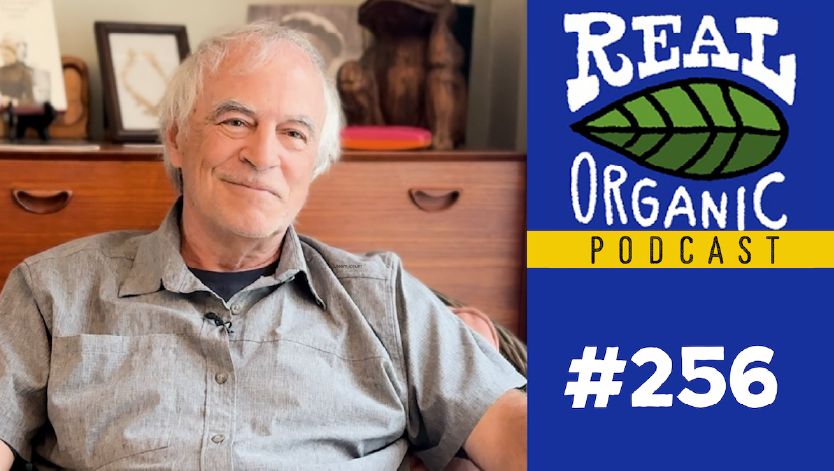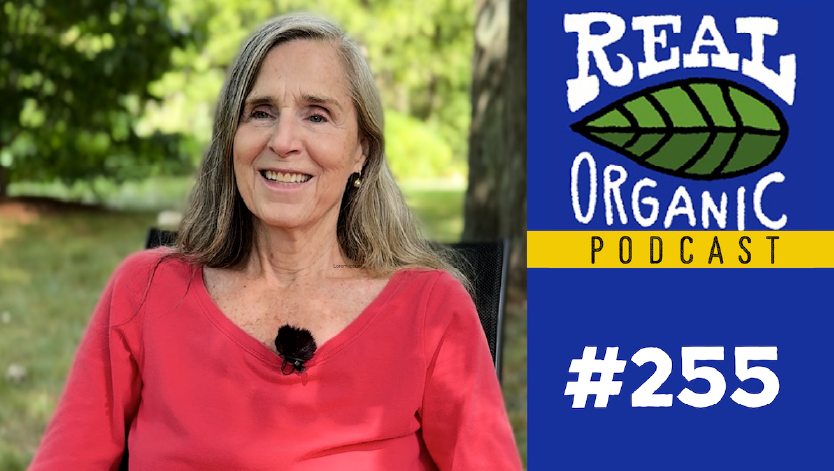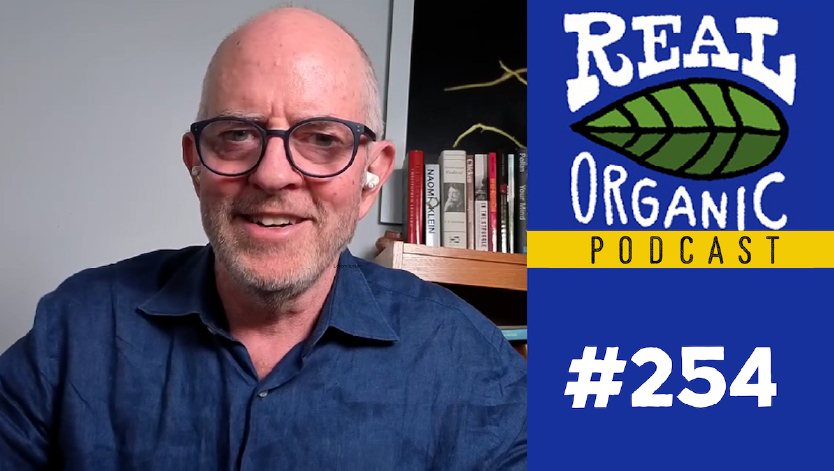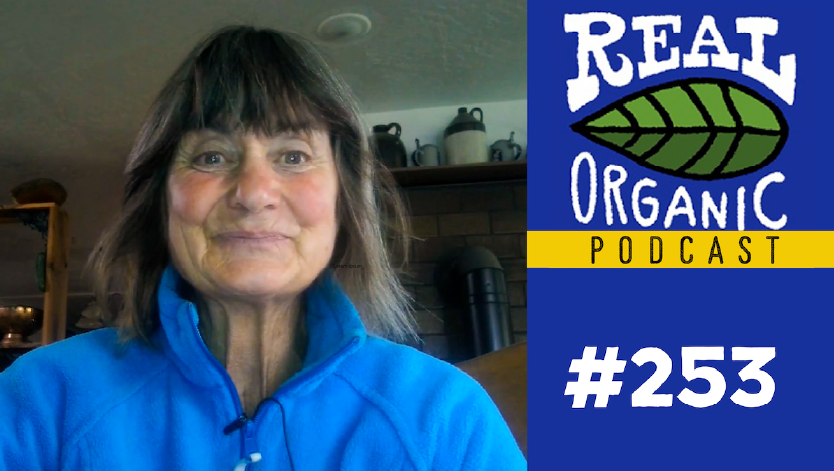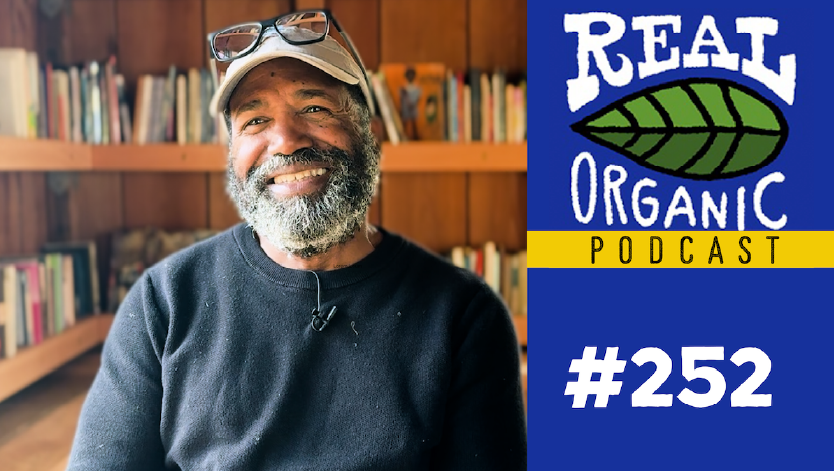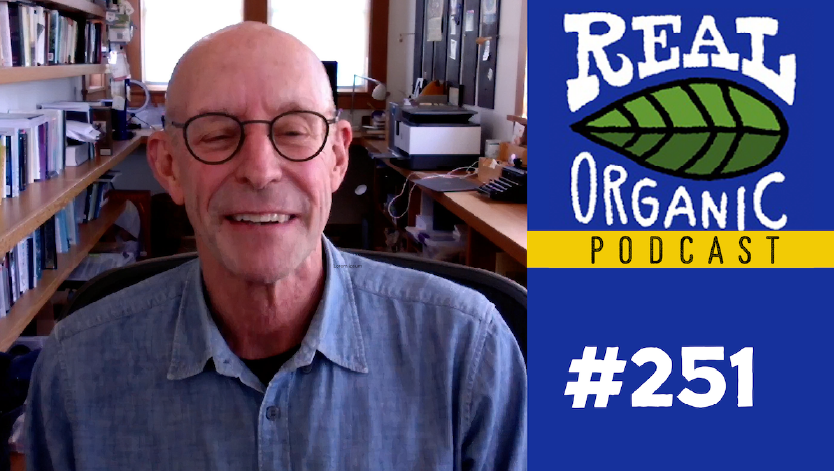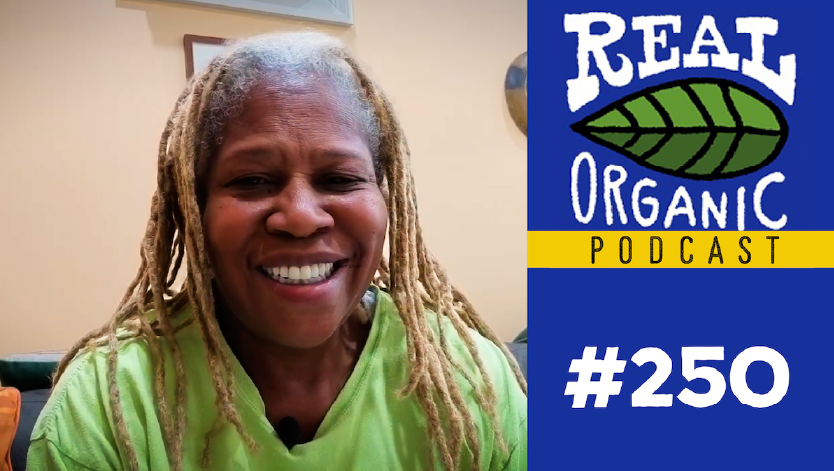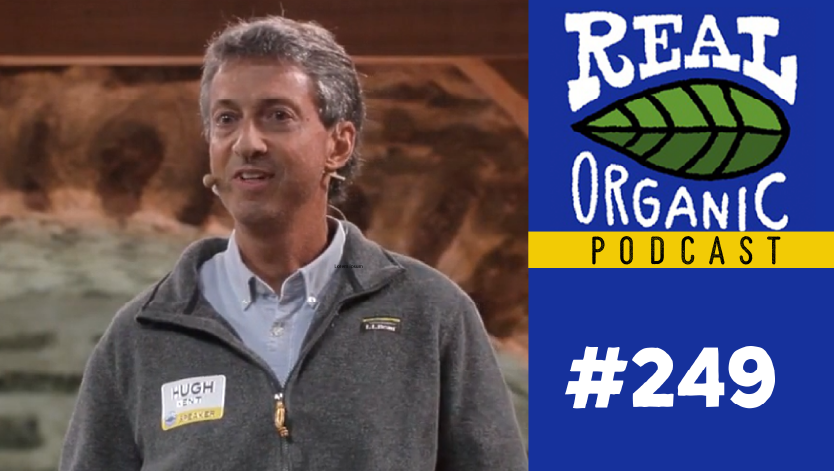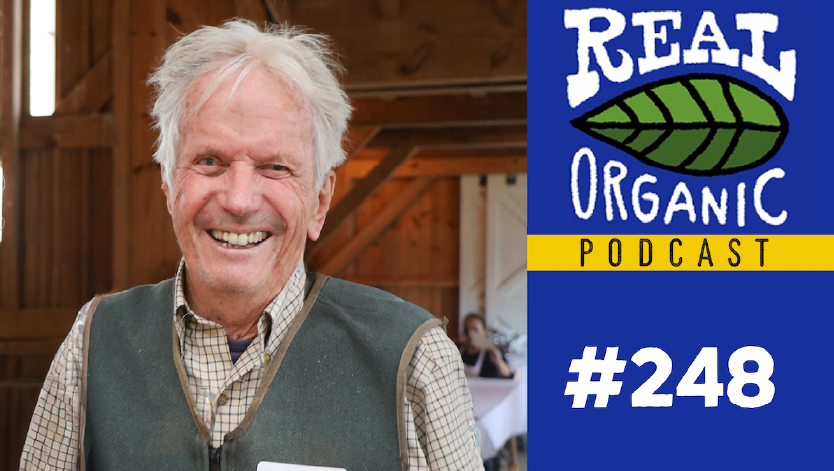Episode #235
Steve Ela: Organic Isn’t Linear Thinking
In this wide-ranging conversation, Steve Ela explores the evolution of biological vs chemical agriculture, from his own journey as a conventional grower to becoming a leading voice in the organic movement. Drawing on his experience as a tree fruit farmer, NOSB member, and advocate for soil health, Steve breaks down why the real revolution in farming isn’t about technology – it’s about returning to biological systems. He explains how organic farming requires lateral thinking, long-term planning, and a deep respect for complexity that chemical agriculture often ignores. For Steve, soil isn’t just the foundation of farming – it’s the key to our future.
Our Steve Ela interview has been edited and condensed for clarity:
You can subscribe and download episodes of our show through your favorite podcast app, our YouTube channel, or stream the audio-only version here:
Dave Chapman interviews Steve Ela, Spring 2024:
Dave Chapman 0:00
Welcome to The Real Organic Podcast. I’m talking with Steve Ela today. This is our second interview with you. I think we have a ‘Know Your Farmer’ interview as well. The first interview was my co-director, Linley Dixon did. It was excellent. I told you I listened to it as I drove to this conference today. You all covered a lot of ground, and I want to touch base on some of the things that you talked about there.
Dave Chapman 0:25
We had a great conversation earlier with Eric Sideman. Steve, just to remind people, I really encourage you to go back and listen to that interview again. It was excellent. It’s probably three years old by now old. It was during COVID that it took place.
Dave Chapman 0:53
I got to know Steve through his service on the National Organic Standards Board. I was a farmer who started going to meetings, and I really felt like a baby when I walked into…the first thing I did was the NOC meeting, the National Organic coalition meeting, which is always the day before the NOSB begins, National Organic Standards Board. I was stunned by all these people fairly well-dressed up in this room, and they all knew each other. There were a lot of them, like 60 people, and I didn’t know any of them.
Dave Chapman 1:34
Then the next day, there was the NOSB meeting. We were talking about hydroponics. This was back in Vermont. Gene Richardson was so proud to have the meeting in Vermont.
Steve Ela 1:52
That would have been the year before I was on board.
Dave Chapman 1:54
That was the year before you came. I really actually vividly remember the part of going in to the NOC meeting, and all these folks were there, and we had a rally. We had a rally about organic at that meeting at lunchtime. We were careful not to interrupt the proceedings. Gene was concerned. You came on the next year, and that would have been what year?
Steve Ela 1:54
2017. My first meeting was Denver. Then the following meeting was the Jacksonville meeting in that fall. I got the in right at the peak of the discussion, I guess.
Dave Chapman 2:18
The hot spot. Actually, I went for meetings even for a full year and a half before that, talking about this issue.
Steve Ela 2:45
Then, certainly I echo, farmer from western Colorado. I had never really known exactly what the NOSB did. Probably foolishly applied, but partly been on the organic Farming Research Foundation board, and a number of people from that board had gone to NOSB, and so seemed of interest and I enjoyed that sort of thing. So, there I was. But my first meeting, I walked into the room and I didn’t know anybody either. A few people from OTRF, Organic Farming Research Foundation, but it was all new people as well. I’m not great with names. I’m great with relationships, but not names. So, it was a active learning curve.
Dave Chapman 3:34
I would say to people that there’s a group of farmers and some people from nonprofits who are involved in lot of these activities, like OFRF and NOSB. Endless initials, which are totally confusing to people who haven’t spent time there. But I have great respect for that group who have become very knowledgeable about these issues. These are political issues about: how are we going to define organic, and how are we not going to define organic? Could you talk just briefly to explain to people who don’t understand. What do you see as the role of this advisory board?
Steve Ela 4:26
Me, when I talk to people about the National Organic Standards Board – I gave a talk yesterday about it – and partly reason I try and give talks on it is to get people engaged, because being a member of the board and, like, say, I walked into it not really knowing what it was going to be. The longer I was on the board, the comforting part was I realized, “Oh, I don’t have to be the expert.”
Steve Ela 4:51
I don’t have to be the most knowledgeable person in the room. We just have to ask the community. Those are the most knowledgeable people in the room, or in the country. The best thing the NOSB can do is to reach out and ask questions of the organic community and then get that input, and then try and digest that. Because I don’t know how many times, I would think I’d write a document to put out there. Then go, “Oh, this is great. I really nailed it.” You get public comments back, you’re like, “Oh, wow. No, they nailed it.”
Steve Ela 5:23
Here they bring up the deep thinkers, the thought processes, the wording would be better this way. A lot of times absolutely right; it was better from that public iterative process. Means things don’t happen quickly, but I guess I’m a believer in that kind of democracy, that the more people that participate in that board and in the board dynamics, the better reflective the organic community it’s going to be.
Steve Ela 5:55
I think you’ve noted, yes, there are groups that pay people to be there. I am now parttime on the staff of National Organic Coalition, so they help fund me to go to the board meetings. But individuals and people that aren’t those groups also have every right to be there. Their voice is just as important. They get the equal amount of time and public comments. As a board member, I listen to the big groups, but I listen to those individuals too, because they’re the people on the ground. They’re the people doing it. I think, a lot of that just practical experience is really useful.
Dave Chapman 6:36
A part of me was reacting going, “Sometimes I think it doesn’t matter what the National Organic Standards Board advises, because the USDA frequently ignores it.” I think actually Organic Trade Association pointed out that they’ve gone 10 years without acting on a single recommendation moving it to rule making. That was a part of the decade you were there. I was surprised. I think that it was a true statement. I hadn’t realized how many of your recommendations that you’d spent so much work on were just ignored. Were you discouraged by that?
Steve Ela 7:20
I take it with a grain of salt. I saw several roles for the NOSB. One is to give recommendations that are acted on. As you noted, there may have been a drought there. Actually, I don’t know about that or specifically, but we’ve got some major recommendations through now with strengthen organic enforcement and organic livestock, poultry practices and origin of livestock, some other minor ones. If we look at paper pots and some of these other ones, there are things that have gone through. It is discouraging at times to make recommendations and not have them go forward, and that can be frustrating.
Steve Ela 8:15
I also believe that frustration is there, but it is okay for the board to make recommendations that may not go forward because then they’re on the books. There has been a public debate on this, and at some point in the future, there is this reference point of these discussions, and this placeholder of history that the board can look at and say, “Well, we talked about this seven years ago,” and refer to that and then move forward.
Steve Ela 8:40
The other thing is, unless there’s NOSB recommendation on the books, it gives no traction for other groups, like National Organic Coalition or Organic Farming Research Foundation, or even OTA, or any of these, to then push the National Organic Program to pass it. You have to have those recommendations sitting there and say, “We should go to rule making with this.” Even if they sit there for a while, it’s still a placeholder. I get frustrated that some of those aren’t moved to rule making, and on the other hand, they create space that wouldn’t be there otherwise.
Dave Chapman 9:16
The recommendation that, of course, we were talking about…it was the issue of hydroponics that brought me to the NOSB meetings. I had never been to such a meeting. I was a very solitary farmer with my family and the farm, but I really didn’t get out much. When I saw that hydroponics were being certified as organic, it was very disturbing to me that something that was so opposed to the principles of organic would be considered. Could you talk about the principles of organic and why hydroponic might not make sense in that world?
Steve Ela 9:33
Obviously, I was one of the groups that was opposing hydroponics. So, we agree in principle already. As an organic grower, and I grow perennial fruit trees, so there is no hydroponic production for that. Obviously, one of the reasons I like being a grower is because of the perennial aspect. Part of my background is in geology as well. So, it’s like long term thinking. Then my other background is ecosystems, which fascinate me. If I could have been an ecologist, I probably would have been in different walk of life.
Steve Ela 10:44
To me, as I moved from conventional to organic, the shift in thinking – from magic bullets or single source choices to thinking of how we manage an ecosystem – one was made a lot of sense, it was also very natural, and very lovely because I love thinking about the whole system, and how little things change in a system, and how it affects the big system. Coming back to being perennials, we have to think long term anyhow, because we plant a tree and may not pick a crop from it for six years. Everything we do is not just for this year’s production, but for next year’s and the following year’s production. So, you’re thinking multi-year all the time.
Steve Ela 11:27
To me, soil being the basis made a lot of sense, because it is part of that ecosystem, and it is part of the buffer of that system. It holds nutrients, it adds them, it subtracts them, but it creates a more even flow that takes out peaks and valleys and it’s the same whether we’re talking biological control of insects or other things. These buffers are really important. A perennial tree is highly buffered. It’s got nutrients held in the wood. You might not see a deficiency for three years if there’s a deficiency.
Steve Ela 12:02
To me, the soil really was the critical basis. I can tell a story – I got out of grad school in soils and came back to the farm. It was when high density fruit planting systems were really coming into vogue. So, you’re moving to these much more tightly spaced trees that came into production earlier, dwarfing rootstocks. Part of the deal with that is you plant them, and you need to get them to grow and fill the space very quickly. So, you’re trying to get the tree to fertilize it heavily to get it to grow.
Steve Ela 12:36
Colorado has some kind of interesting soils. They don’t always fit the books very well. Where we grow, they’re fertile, but they’re not fertile. We plant these trees and they weren’t growing like we expected and so, you add more nitrogen. We actually went up to some very high nitrogen rates for a while, and we still weren’t seeing the nitrogen response, which means, “Okay, there’s another limiting factor.”
Steve Ela 13:05
Soil tests all came back fine. Everything was peachy keen there, but the trees weren’t expressing that. So, you try potassium, phosphorus, manganese – these various things. After rooting around for five or six years with the human hubris of, “If I can figure this out,” I didn’t figure it out. I don’t know what the limiting factor was. Why we weren’t seeing those nitrogen responses. That experience of like, “I’m fresh out of school, I’ve got all this knowledge, I can’t figure it out,” really brought me back into the soil mantra of organics of; build the soil, and realizing that this ecosystem is so complex that my brain can’t understand it.
Steve Ela 13:55
Putting a tree in a healthy soil and letting all these nutrient interactions happen continuously, so that the tree can feed when it wants to feed, not when I decide it should feed, it was driven into me because I couldn’t figure it out otherwise. I think the soil is the basis, because it’s this dynamic thing that’s releasing and taking up nutrients. It’s the smorgasbord for the tree roots. In a hydroponic system, we’re assuming we know what those plants need all the time, and we’re giving it to them, and I don’t think we do.
Dave Chapman 14:30
People ask me if we’ve seen nutritional comparisons of hydroponic organic, so-called certified organic, and soil-based organic in blueberries or tomatoes. I say, “Well, of course, the test would show a difference. But the sobering thing is, we have no idea what the food should be.” We’ve identified a hundred thousand compounds in plants. We don’t know what most of them do we don’t have names for them, we certainly don’t know how they interact and we don’t know how they interact with us. So, how are we going to save what’s optimal, or what’s sub optimal?
Steve Ela 15:21
As I talked about organics now when we do farm tours and things, I really look at the revolutions. In the 50s, my granddad was growing tree fruits, worms were a huge issue. They were spraying lead arsenate, and not even though that effective. They would pack a clean fruit, one worm fruit and two worm fruit. Those were actual grades. My granddad would guarantee his fruit. He said, “If you buy a two-worm fruit and there’s only one worm in it, bring it back. I’ll give you one with two.” The fight they had wasn’t lead arsenate; it wasn’t really controlling it.
Steve Ela 16:01
When DDT came out, of course, it was a miracle drug. Suddenly, you had clean fruit. I can see why people went after that, but we realized down the road all the issues of that. But that was the chemical revolution. There was also the space program, where we thought we could manufacture foods. You had Space Sticks, you had Tang – all these things. That’s when ingredients expanded into all the names that we don’t know.
Steve Ela 16:27
I think, at this point now – and this is my pitch for organics – is we’re in the biological revolution. So, we had the chemical revolution. We realized that that doesn’t always work. We get on the chemical treadmill, and that these fake foods don’t actually feed us and so, now we’re going back. With waste water treatment, we’re using biological systems. With heavy metals, we’re using biological systems. If we’re even talking about the BP oil spill in the Gulf of Mexico, a lot of that oil got eaten up by biological mechanisms.
Steve Ela 17:01
I think now we’re moving from the chemical revolution to the biological revolution. It also is true in food as well. It’s not just agriculture, but agriculture produces food. But we realized we can’t manufacture fake food. We still have people out there trying to do it, but it’s not the wholesome food that really feeds us. I think, going back to your point, we assume we can add all the nutrients into a hydroponic system that are needed, but off of those hundred thousand plant compounds, we don’t have any idea what are really important and what the mixtures and what the subtleties are. We can have the basic box, but do we actually have nutrition? Because I don’t think we understand nutrition.
Dave Chapman 17:45
I don’t think so either, Steve. I’ve been amazed. I’ve been talking to some of the people in the Food is Medicine movement, and God bless them. I agree completely. Their big thing is to turn people away from ultra processed junk food and have them buy food and eat that instead, and they’re so much healthier. There’s so many benefits and positive aspects to their lives and to our whole system, our whole society, our health care system. But it seems to me that the curiosity needs to grow and say, “Well, is a carrot a carrot? Is this carrot the same as that carrot? Or do they have perhaps a significant difference in the impact on the person who eats them?”
Steve Ela 18:35
Absolutely. I think we always forget the psychological effects too. We always want to be mechanistic and just look at chemicals. But food we eat multiple times a day. You can either do it without thinking about it, or you can do it with thinking about it. Food brings pleasure. For a lot of people, food doesn’t bring pleasure. We have a society that says, “Just shove it down your face and get on with the day.” But you think a lot of societies where you sit down to eat and you look at your food and you inhale it, and you take it in with your eyes, and that’s all part of human health.
Steve Ela 19:13
We can’t divorce the psychological from the from the physical. I really feel like uniform food, a tomato that’s all the same is kind of boring on the plate. But when you have different colors and different shapes and different textures, it engages your brain as you eat. So, as you’re tasting things, it creates curiosity and excitement or bleh, ” I don’t like that.”
Steve Ela 19:36
Being an apple grower, I love growing all these varieties, because there can be varieties that I think are inedible. Invariably, somebody comes up like. “That is so good,” because we’re all different – we’re species, but we’re not all clones. I think that’s the other thing we need to remember: all these different variations bring different things to different people.
Dave Chapman 20:02
I was listening yesterday to a Senate hearing. Bernie Sanders was conducting it, but it was a whole committee, and they were talking with the head of the FDA. The head of the FDA actually said that the food processing companies are now actually able to make food that is addictive, and that they know how to do this. Our scientists are very good at teasing apart how to play with our centers of craving. I thought that was interesting to hear a leading scientist say that junk food is addictive.
Dave Chapman 20:49
So, it’s not so simple how to handle an addictive substance. It’s not easy to ban it. Tremendous lobbying power of these organizations and yet the consequences for all of us are great. It’s not just the people, even who choose to eat the junk food if it is a choice, but everybody’s paying for the healthcare. We’re facing genuine crises of obesity and diabetes that appear to me that it’s going to be unsustainable as a society.
Steve Ela 21:25
Yeah, I agree. I think, healthy food is just a fundamental human value. We’re very fortunate where we live that we have lots of access to food – we’re not hungry – but I think there is a real question: “Do we have access to real food?” It comes back to what we talked a little bit earlier, a bit about value. So much of our society is taken as value as the most for the cheapest – most volume for the cheapest price. But I think we need to re look at what value means, because it used to be… value was getting some equation of getting the best thing for the best price. It wasn’t the most in volume. At some point we got co-opted into bigger is better, and more volume is something and we lost the actually question: “What are we paying for?”
Steve Ela 22:20
This may be really cheap, and we may be getting a lot of volume, but there may not be much there. We’d actually be better to pay twice the price for something that’s nutrient-dense, and that comes back to foods. If you’re going to have a tomato that tastes like cardboard, “Okay, I can get 10 pounds for three bucks. It’s cool.” Or, “Can I get three tomatoes that make me happy and that I eat and puts a smile on my face for the same price.” Or, “Which is the better value in terms of real value?” I think we need to look at that more. I’m really worried that our food system has moved people away from taste and enjoyment into just consumption and how much can we consume.
Dave Chapman 23:04
There are a lot of talking points that have been developed to attack organic. One of them is: “It’s the food of liberal elites.” Another is that, “the world is going to starve unless we grow food in a heavy industrial chemical way.” I don’t believe either of those, but they’re effective ways of confusing the conversation. I’d love to talk about the liberal elite thing, because it really pisses me off, but let’s talk about, “the world’s going to starve.”
Dave Chapman 23:40
We had talked about this article in The New York Times this weekend called “Sorry, but This Is the Future of Food.” It was an opinion piece by Michael Grunwald. Its basic point is that if we don’t go to large scale industrial agriculture, the world will starve. It’s an old story – that line has been said for a long time. What’s your response to that?
Steve Ela 24:07
When I left the NOSB, it was part of my final goodbye. I went to grad school at the University of Minnesota; I was in Borlaug Hall. Borlaug was the Father of the Green Revolution. We were in the basement – how fitting. But in my undergrad work, I also really looked at the Green Revolution all the readings on that, and recognized a lot of the literature of it’s not just production, it’s distribution. I think Frances Moore Lappé really nailed that. That was enlightening to me – like, this isn’t the food quantity problem, it’s a food access problem.
Steve Ela 24:46
I think we’re still there. One farmer feeds 75 people and all these things, but they don’t – they feed X number of people. You can take the raw numbers and do that math, but it’s actually not true. A lot of people in the world, even with this big Ag, are still starving and don’t have access to good food. Even in the United States – we have the food deserts where it’s not there. So, until we really address the problem of food access and food distribution, quantity doesn’t matter.
Steve Ela 25:21
We need some, certainly. There can be starvation easily, but I think it’s a straw man. That argument is designed to say, “No, we just have to maximize everything at all costs,” instead of saying, “Really, what is the cost and where are we paying for it?” The other thing I talk about as an organic grower is, “Why does organic cost flow more?” My response is, “Because I’m internalizing costs that other people get to externalize.” I’m not causing soil erosion that clogs the riverways and causes issues with water treatment or they have to dredge the Mississippi. I’m not contributing to the dead zone in the Gulf of Mexico, and I’m not contributing to Midwest cities having to treat water for nitrates and pesticides.
Steve Ela 26:07
All that money is being paid for by your tax dollars. So, you’re paying for it. It’s just in a different way. Then my organic fruit, I’m trying to keep all those costs on the farm and as part of the food. So, coming back to value or costs or things, I don’t think there’s that much difference. It’s just where we’re paying for it. Are we paying for it in our taxes and in all the things we have to do to mitigate things? Are we paying for it in the food up front?
Dave Chapman 26:35
That’s actually a pretty big statement. As somebody pointed out in the conversation earlier, they’re subsidizing that commodity farming on top of paying for all the unintended consequences.
Steve Ela 26:52
Exactly. This author is going right down the standard talking points – tick, tick, tick, tick. But it ignores those externalities. It’s like, “Yeah, we can produce more food, but there’s a cost.” The Midwest can’t last forever if we keep eroding soil and we keep polluting it. It’s got really deep soils – it’s lasted quite a while – but it’s not a given it will be there forever.
Steve Ela 27:17
I think of the Iowa floods. We were driving across – it’s probably been 15 or 20 years ago – when they had huge rains and things. Gullies were cut across fields and the organic farms were intact – no gullies. Water didn’t run off. What’s the cost of all that flooding from those conventional farms? I think, it’s great to take production in itself, but you’re not looking at it as part of a whole system again. Anytime you want to take one little piece out and say, “Oh, we have to do this,” you’re making them snake and not looking at the big picture.
Steve Ela 27:51
I think, in the big picture, we really need to step back and say, what are all the costs? What are all the inputs? What’s the human suffering from pesticide plants, from workers’ exposure, from farm exposure, etc.?
Dave Chapman 28:08
Part of the part of that runoff from Iowa has created cancer alley down in Louisiana. People are dying because of the way people are farming somewhere else. It’s a real thing. Could you talk about what’s the mindset for you? You’ve literally gone from being a conventional chemical farmer to being an organic farmer. Could you describe how you thought about problems when you were a chemical farmer, because the way that we live, affects how we think about problems, and the way that we make a living certainly affects it.
Dave Chapman 28:53
You had one mindset – maybe a mindset that was concerned – but you had a mindset of how to approach problems. That is that system. Then you’ve got a different mindset that you learned and developed as a result of becoming an organic farmer. Could you describe those two mindsets?
Steve Ela 29:09
Yeah. Now it’s kind of cool. It’s fun to have hindsight. If you would talk to me in my 20s and the all the mind problems where you give the thing of the solution is obvious, but you have to think laterally to get to it, I failed. I’d be in a room and 10 people get the answer like that, and I’d be like,””Ahhh!” I wouldn’t get it, because I thought very linearly. I think one being a farmer in general – but then especially being an organic farmer, where you don’t have magic bullet fixes, where you have to think as a system – has totally changed my thought process to thinking extremely laterally.
Steve Ela 29:50
My mom always said growing up… She grew up in the Depression, where they had nothing – literally nothing. My granddad always said, “Well, if something breaks, you can usually look around, and within 10 feet there will be something that you can use to fix it with. It may not be pretty, but it can get you by.” I think that, just taking that analogy, that’s how I think now; “Okay, we have a problem here, let’s think around the edges. How can we work with that problem?”
Steve Ela 30:21
That, again, comes back to thinking like an ecosystem. It’s usually not just one solution; it might be putting three or four things together. So, I had that very linear thinking and working in organic systems – where you have to think bigger picture, you have to think broader, you have to think multiple ways to solve a problem because each one isn’t going to be the magic fix – has taught me to think completely differently now. I love that. It makes life a lot more fun. I like doing crossword puzzles because I love the play on words. You read it and you’re like, “Oh, this is what it means.” It’s, “No they, they twisted it.”
Steve Ela 31:00
So, the ability to play with that and have fun with it is enjoyable. But I think we live in a society that wants to be very linear. You do this and you this happens, and we don’t recognize the external effects and the other effects – the hidden effects – that we’ve seen.
Dave Chapman 31:19
Do you think that’s the essence of the science of ecology – seeing the amazing, infinite connections and start to understand that there are no simple systems in that way?
Steve Ela 31:35
I think that’s the beauty of ecology. I was an intern at the Land Institute, and Wes Jackson and Wendell Berry would often get into discussions, and I think it was Wendell that said – and could have been West too – but the discussion of humans, we’re really uncomfortable with what we don’t know. We don’t like that, and so we want to label everything. Then the things we don’t know or that seem random, we say, “Oh, that’s random,” because we don’t understand it.
Steve Ela 32:01
Well, it’s not often random, because as we go through science, we start to understand more of these systems, and suddenly, “Oh, we thought that was random. No, it actually is a very finely tuned system.” I think that colored my thought as well, like, “Oh, yeah. We should be uncomfortable with what we don’t know, and we should experience the discomfort and not be scared of it, but just continue to look at it.”
Steve Ela 32:27
I also had a professor as an undergrad, and in the theory of science, one of the things is there is no proof – you can only disprove things. You can’t actually prove them, because there can always be one more data point that doesn’t fit the paradigm. It’s the points that don’t fit the paradigm that are especially interesting, because they’re real – they’re not fake. They’re the things that make you look at what you think is the norm and say, “It doesn’t quite fit.”
Steve Ela 32:52
I think ecology looks at that. It takes in all the tips and tails of the of the bell curve, and that’s part of the system. That’s where change happens – out on those edges. I think in the organic industry, we’re out on the tip or the tail. I think we’re on the tip, personally. We’re ahead of the curve. But that’s where change and innovation happens – because you don’t have all the other comforts of all the other tools. So, when I talk about a biological revolution, I think the organic growers are on the lead of that.
Dave Chapman 33:30
Yeah. It’s interesting. I had no idea that ecology was such a recent science as a formal science. I think it was 1870, somewhere around there, that somebody in Germany started to coin that term and created this study of systems. I know George Washington Carver, around late 1890s, was studying ecology with some of the people who were the first generation. He was the second generation of ecologists in America. Of course, he was a pioneer of what we would call ‘organic farming.’ That word wasn’t applied to it then, but it was exactly what he was teaching.
Steve Ela 33:30
Well, let me look at indigenous farming systems honed over thousands of years of, I’m just going to say, observation. That’s often that a lot of the key is sitting back. One of the fruit growers that they first met when they came back to the farm is up in Washington. He was talking about pruning trees. Every apple variety has its own form -some are weepy, some are stiff. He said, “I’d let the tree tell me. I’ll try some, and then I’d sit back and I’d look at it, and what was the effect?” Instead of, like, “I know what I’m going to do and I’m going to do and I’m going to prune this way, I’m going to hone it into the shape.” No, he let the tree talk back to him. That was really sage advice. I think there, again, ecosystems; watch, observe, let it talk back to you, and then change.
Dave Chapman 34:57
This makes me think. I don’t know if you ever read that Nature article. It’s a very fairly famous article in which they looked at some fields – I think it was in Sweden or Finland – and they were comparing the yield of a conventional grain and the same grain grown organically. They saw that the conventional chemical field had a higher yield of something like 20% of this particular grain, in this particular situation. Based on that, they made the extrapolation that organic was less productive, and consequently to grow the same amount of food was going to take 20% more land. To get that land with an expanding population, we would have to clear cut the Amazon, get rid of the forest and kill the engine of carbon sequestration.
Dave Chapman 35:51
This was told to me. The first time I heard of this article was from the chair of an environmental studies program at Dartmouth College. He said, “Of course, organic agriculture is much worse for the climate thing than conventional.” I had no idea what he was talking about. I was like, “What are you thinking?” That’s what he was talking about. I’m just curious, do you have thoughts about the thinking process that came to that conclusion, and what might they be leaving out?
Steve Ela 36:25
Yeah. A lot of thoughts. I think, again, it’s taking a data point and saying, “This proves the point,” instead of just taking data points and saying, “What doesn’t prove this point?” So, it’s trying to make proof where you can’t actually prove something. I can look at my own production. I can grow an organic peach and be competitive with a conventional peach grower on yield. I just talked to our crop insurance agent this fall and turned in my production figures, and she’s like, “Oh, your organic yields on apples are the same as the conventional ones.”
Steve Ela 37:00
I would have said they were lower, just because we have various reasons. But no, there’s her response. She sees all the production figures for our locality, and we were right in the ballpark. So, I think you can cherry pick. You can pick a crop that organic has lower yields, you can pick a crop that organic has higher yields, but I’m also going to say, it’s a really unfair comparison. Because if we look at the research money that has gone into production systems, and the conventional system has gotten billions and billions and billions of dollars of research, to help fine tune it and move it forward, organic systems have gotten a pittance – maybe one or 2% at best.
Steve Ela 37:45
We’re also trying to understand very complex systems, so they’re long-term projects. It’s like saying, “Oh, the kid that went through school is better educated.” Well, “Yeah, because they went through school.” So, you’ve gone through all this research, and then you’re saying, “Oh, yeah. This production system is better, what if we put that money into organic research? Where would we end up?”
Steve Ela 38:11
Even with the pittance we put in, I look at tree fruit production, how many organic practices have now been adopted by the conventional industry? Cover crops, mating disruption, biological control, all these were pioneered on organic farms and are now widespread and normal practices. So, instead of saying, “Organic can’t keep up,” and just making that presumption where we say, “Hmm! Look at how well organic has kept up despite the fact that it’s not funded.” That’s amazing that we are competitive even.
Steve Ela 38:48
A F1 car on the race track going against a Model T, and yet the Model T is keeping pace with it. I don’t mean organic is old, it’s just that we haven’t had that benefit of all that research. So, it’s really frustrating to hear that we were not good enough, because we are and we are keeping up – remarkably well.
Dave Chapman 39:15
That’s great. I actually hadn’t even thought of it from that perspective. Are there other perspectives that might also…I’m so troubled by the idea that it is better for the climate to manufacture nitrogen in a factory – a tremendous energetic cost – and then to put it on the soil, burning out the organic matter, and then, because the whole system is impoverished, we’re going to hit it with pesticides, and because of the weeds, we’re going to hit it with herbicides – which are going through the roof right now because of GMO breeding – and all of that. The punch line that this article had is, “Yeah, that’s better than your farm, which doesn’t use any of the toxins, which is mostly, not entire but mostly, self-fed.” What’s wrong with that? How do we make sense of that?
Steve Ela 40:11
We definitely still buy some off-farm inputs – we’re trying to minimize that. That’s part of my goal – how can we get rid of a lot of those? But, let’s just be lazy. I’m a busy person, and we all are. There are more things to do in the day than I have time for. Why would I go out and load up a sprayer and spray something, when I cannot do it and let a ladybug or a lacewing or a Deraeocoris or an earwig do the job for me? They’re on call 24 hours a day.
Steve Ela 40:46
Why would I buy nitrogen when I can plant a legume and just pull it right out of the air? I don’t have to do a thing. I don’t have to drive the tractor through, I don’t have to spread it, all I have to do is try and work with the system to try and help manage it. I think we’re control freaks. We want to have absolute control and absolute precision…we need to let go of that, because Mother Nature does a lot of this really well. There’s some things he doesn’t.
Steve Ela 41:17
We have worms in our apples, and they’re not going to be biologically controlled at this point. So, we do need to control those. But if we control those, let’s not screw up the rest of the system where Mother Nature is doing our work for us. That’s just, like, work less, let her do more. I think we need to learn that, and it comes back to paying attention and watching and not screwing things up. Again, comes back to hubris. Let’s just be humble and say, “We don’t know everything,” and then observe.
Steve Ela 41:52
We talked about ecology in the 1870s wherever, but a lot of the generalist – early scientists – were observers. Trying to figure out, “Why did that happen? Why did this happen?” They watched, and they took things in. We need to keep doing more of that.
Dave Chapman 42:08
Yeah. Thank you. Science is a funny word – it gets bandied about a lot. It’s used a lot in chemical agriculture. When you read their literature of why people should choose to use chemical, use a lot of chemistry, and in fact, it’s used as an attack against organic, saying, “Organic is unscientific.” I always think, “That’s not true.”
Steve Ela 42:39
The problem with science is that it doesn’t do well with multivariate analysis. Most science projects have one variable, change one thing, that works really well with conventional agriculture, because you’re not looking at the rest of the system. You’re just saying, “If I add more of X, do I get more of Y?” I add more nitrogen, I get more yield. But it doesn’t look at any of the other aspects of soil erosion, or carbon emissions, or whatever.
Steve Ela 43:09
The science of ecology is developed for multivariate analysis. It’s still tough to take a system and analyze the effects on multiple things. But, let’s just take a fruit blossom in the spring, that’s in full bloom, and we’ve got a cold weather system coming in. You can do freeze tests on that and figure out when it’s going to frost. It’s a bell curve, because not all blossoms are made the same. But what happens to that blossom before that changes the outcome?
Steve Ela 43:39
So, if we have a string of 80°C days and we’re suddenly going to go to 25°C, yeah, that blossom is going to get smoked – it’s going to be killed. But I’ve seen fruit blossoms where we’ve had cool days, where we’ve been right at 29°C or 30°C for multiple nights, and maybe the day only gets up to 30°C or 40°C, and those blossoms come through 25°C with no problem. Same blossom, same temperatures. If you do those scientific studies, and just look at one variable, you’re going to get a result. But if you look at the rest of what has affected that blossom beforehand, you get a very different result.
Steve Ela 44:20
I think that’s science as well, and we have to be cautious. It’s really easy and cheap to do single variable studies, and it’s really costly and long-term to do multivariate studies. But the multivariate studies give us a lot more information.
Dave Chapman 44:36
Those single variable studies are powerful. We do learn things, but the problem is, there’s a lot we don’t learn.
Steve Ela 44:45
As a fruit grower, because there’s so much we don’t know about what affects the fruit blossom or what affects a root in the soil, we want to just take those single variables and say, “Oh, yeah. Adding more nitrogen is better.” But as you noted, maybe adding that much straight urea destroys our biome, and four years down the road, we’re now on a treadmill that we didn’t know we’d even started. That’s what’s hard to measure. So, it’s not that it’s not scientific, it’s just much more complex.
Dave Chapman 45:19
It’s what Stuart Hill calls deep science. As opposed to shallow science, he says shallow science is where you take a mouse, you give it a shot of something, you see what happens. Deep science is where you’re talking, as you are, about this mouse in an incredibly complex ecosystem, and how is it reacting, behaving and being healthy or unhealthy? How is it interacting with this other mouse? That’s right.
Steve Ela 45:47
Yeah, exactly.
Dave Chapman 45:54
Maybe we’re getting there, but a question; you are certified with the Real Organic Project, you also work with the National Organic Coalition, you’ve done a lot of work with the National Organic Standards Board and with OFRF (Organic Farming Research Foundation). I’m curious from these different perspectives, certainly NOSB is entirely focused on regulatory management and reform. You’re still working hard at that with National Organic Coalition. Real Organic Project does work on regulatory reform – we haven’t abandoned it – but I would say that our focus is, in fact, on creating an alternative to what is, at the moment, a failed regulatory apparatus. What are your thoughts about that?
Steve Ela 46:55
Global question, it is.
Dave Chapman 46:56
Yeah, it’s a big question, because I really see people go one way or the other, and they’re both powerful.
Steve Ela 47:05
They are both powerful, and I think we need them all. It’s come back to an ecosystem – just having a monoculture doesn’t work. These various groups are all doing bits of the puzzle and working on things, and I think they all are additive. Sometimes they don’t always agree with each other. Sometimes we’re cross ways, but overall, it’s an additive process. I think we need everything. I always feel like, you’re in a room and there’s somebody that’s just…you’re like, “Wow, that person is a wack-a-doodle out there.” But they create space. They’re out here yapping about this, but the person that’s a little more normal than them is more normal because of that person. That person brings pushes the envelope sideways into what we all think about.
Steve Ela 48:00
I’m not saying any group that we’re talking about is wack-a-doodle or not, but it’s like we all bring different viewpoints to that space. I tend to be an optimist, and I tend to be a moderate. My dad was a district court judge, my mom was the farmer. So, I think probably some of this comes from my dad’s upbringing, but I still see a place for organics in the in the national landscape. I share the frustration that recommendations don’t go into rule making, and we have to play politics with some of these things. Things we don’t agree with are still approved. Absolutely frustrating.
Steve Ela 48:43
Then, I also look at the side of; but we also have taxpayer money helping support organics that we wouldn’t have otherwise, we have fraud investigations that none of us would be able to look into, and we have Customs and Border Protection now, looking at organic grain shipments that might be fraudulent. That would be very hard for the private sector to do. We have benefits and we have curses. The problems are real. I don’t want to discount them – they’re extremely frustrating – but I tend to look at them, again, in the whole [inaudible 48:18] of things. I want to keep up the fight.
Steve Ela 49:25
I think it’s important, the Real Organic Project does what it does, because it creates a baseline that we can look to and say, “Yes, this is important. ROP, we’re a group that is fighting for soils, and the benefits of that, and the benefits we don’t even know of yet.” Then that also helps us in the National Organic Coalition as we’re looking at rule making and looking at some other things, like, “Yes. This is how we can continuously improve.”
Steve Ela 49:56
Yeah, there are warts in organics. Yes, we need to continuously improve. This is the system we have right now. We don’t have a good private system for certification. I don’t know if we could fund it or not, because already growers are saying it costs too much. So, let’s work on both sides of it. Let’s try and make the current system better, and also let’s poke the current system and say, “You can do better.”
Dave Chapman 50:22
It’s interesting. Of course, Real Organic certification is free. It’s free because other people believe that it should be free, and they donate money to make it so. I think in some places, certainly in Europe, places like Denmark, certification is free because the taxpayers all pay for it. Their level of support, in terms of the amount per citizen, is far greater than what is happening in the US at this point.
Steve Ela 50:55
Real Organic Project takes organic as the baseline too, and that adds to it. If we had to pay for all the looks at organic certification, it would be a much bigger project than cost – it couldn’t be free? I think we’re building on that, and I think that’s the argument now. You go to Congress and say, “Well, you should pay for certifications.” Like, “Well, why?” But it’s like, “Well, you’re paying for crop insurance for big corn producers. You’re paying for, as we said earlier, water treatment and environmental damage.”
Steve Ela 51:36
It’s harder in a congressional setting to make those links, but they’re truly there. So, the cost of certification is no more than the cost of what we’re paying for all these other public services caused by poor agriculture. But it’s, how do we make that point? How do we win that battle? But I think we need to keep reminding people that we’re paying for things otherwise.
Dave Chapman 52:06
Even the taxpayers, in terms of government programs, are paying for these things. So, where would you rather spend the money, and being healthy?
Steve Ela 52:16
We’re talking about obesity and health care. But again, we’re used to those mono answer – single answer solutions. Congress, especially wants that, but we need to keep making the point. It’s a complex system.
Dave Chapman 52:35
It is interesting. We were talking earlier about; we’re starting to see something new in Congress, which is a bipartisan movement to embrace the concept of organic and it’s new. This until now, it’s mostly been people on the progressive side of the Democratic Party who have actually been the champions of organic. That’s not true in farmers – there are a lot of conservative organic farmers. But in terms of in Congress, it hasn’t been there.
Dave Chapman 53:22
People know that I am no great fan of Tom Vilsack. I think that he has done a lot of destruction to organic in his first eight years. In his last four years, he has not clarified the standards, but he has put some money into supporting transition to organic, and I appreciate that. I think that’s a good step in the right direction. Do you think that it’s possible that we’re going to see something new coming down the road politically, where maybe that log jam is starting to be broken?
Steve Ela 54:01
My crystal ball is a beta model. I don’t know, but I think, let’s come back to, you have a bell curve, and you have the tips and the tails, and change happens on the edges. So, if we’re in a situation where it’s not normal, maybe change happens in unexpected ways. It’s going to be interesting to see a play out, because there are interesting bed flows that end up from coming at things for different reasons, but for the same goal.
Steve Ela 54:35
Transition isn’t easy. Change isn’t easy. Maybe this forces us to re-look at some of our arguments and rephrase them or view them a little differently, and then create different allies and different alliances. I don’t know. I’ll be curious. It’s kind of watching your kid grow up. There’s a lot of work, there’s a lot of care, but you’re also really curious how they’re going to turn out. I’m curious how this will turn out.
Dave Chapman 55:05
All right. Steve Ela, thank very you so much. It’s great to talk.
Steve Ela 55:09
Always great to talk. It’s pleasure. It’s nice to think about these things.
Dave Chapman 55:13
Yeah.


